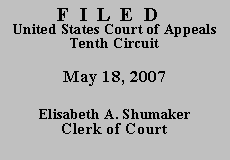

| ANTHONY L. DAVIS,
Plaintiff-Appellant, v. CAROL J. BACON, Public Defender, in her individual and official capacity; RICHARD NEY, Chief Public Defender, in his individual and official capacity; JESSICA R. KUNEN, Chief Appellate Defender, in her individual and official capacity; STEVEN R. ZINN, Appellate Defender, in his individual and official capacity; REID T. NELSON, Appellate Defender, in his individual and official capacity; SEAN C. MCENULTY, Public Defender, in his individual and official capacity; MICHAEL C. BROWN, Public Defender, in his individual and official capacity; ROGER FALK, Appellate Public Defender, in his individual and official capacity; GARY W. OWENS, Appellate Public Defender, in his individual and official capacity, Defendants-Appellees. |
|
We have "not yet determined whether a dismissal pursuant to § 1915A on the ground that the complaint is legally frivolous is reviewed de novo or for abuse of discretion." Plunk v. Givens, 234 F.3d 1128, 1130 (10th Cir. 2000). As in Plunk, however, we "need not resolve that question at this juncture" because our review of the record in both of plaintiff's cases "reveals no hint of reversible error under either standard." Id.
In his prior district court case, Davis v. Bacon, D.C. No. 06-3132, plaintiff sued under 42 U.S.C. § 1983, alleging that state trial and appellate public defenders conspired with state officials to deny him a fair trial and appeal. See R. No. 06-3132, Doc. 1. The district court ordered plaintiff to show cause why the complaint should not be dismissed prior to service because his allegations of conspiracy were conclusory and insufficient to overcome the general rule that public defenders practicing law are not state actors. Id., Doc. 4, at 2-3. After reviewing plaintiff's response to the show cause order, to which plaintiff attached numerous irrelevant photocopies of articles about his boxing career, id., Docs. 6-7, the district court concluded that plaintiff's allegations of conspiracy were still conclusory and insufficient to show that any of the public defenders acted under color of state law, id., Doc. 8, at 1-2. The court dismissed the complaint under 28 U.S.C. § 1915A(b)(1) "as stating no claim upon which relief can be granted under 42 U.S.C. § 1983." Id., Doc. 8, at 2. The court then entered judgment. Id., Doc. 9. Plaintiff filed a motion to alter or amend the judgment, an affidavit and supplement, a motion for leave to amend his complaint, and a motion for leave to file a motion for summary judgment. Id., Docs. 10-14. The district court denied relief in a written order, explaining that plaintiff's allegations of conspiracy were conclusory and insufficient to state a claim for relief. Id., Doc. 15. It does not appear that plaintiff appealed to this court.
It is clear that the current suit substantially mirrors the prior complaint that was dismissed. This appeal is therefore frivolous for the same reasons that underlie the district court's dismissal, and both this dismissal and the district court's dismissal count as strikes under 28 U.S.C. § 1915(g). See Thompson v. Gibson, 289 F.3d 1218, 1222-23 (10th Cir. 2002). We take judicial notice that the dismissal in district court case No. 06-3132 also counts as a strike because plaintiff did not appeal. See Jennings v. Natrona County Det. Ctr. Med. Facility, 175 F.3d 775, 780 (10th Cir.1999); see also Green v. Nottingham, 90 F.3d 415, 418 (10th Cir. 1996) (taking judicial notice of strikes imposed by other courts). Because plaintiff has accrued three strikes, he will no longer be able to proceed in forma pauperis in any civil action or appeal filed in a federal court unless he "is under imminent danger of serious physical injury." 28 U.S.C. § 1915(g).
In light of our conclusion that this appeal is frivolous, the district court's grant of in forma pauperis status on appeal is VACATED, and in forma pauperis status is DENIED. See Coppedge v. United States, 369 U.S. 438, 445-46 (1962). Plaintiff is ordered to pay the entire appellate filing fee of $455.00 within thirty days of the date of this order.
The appeal is DISMISSED.
Entered for the Court
Circuit Judge
*. After examining the briefs and appellate record, this panel has determined unanimously that oral argument would not materially assist the determination of this appeal. See Fed. R. App. P. 34(a)(2); 10th Cir. R. 34.1(G). The case is therefore ordered submitted without oral argument. This order and judgment is not binding precedent, except under the doctrines of law of the case, res judicata, and collateral estoppel. It may be cited, however, for its persuasive value consistent with Fed. R. App. P. 32.1 and 10th Cir. R. 32.1.